23 May2016
By Yupin Bae and Michelle Kotek
Editor’s note: This is the second of six blog articles exploring data on program entry and exit requirements from the latest available (2014) federal collection mandated by Title II of the Higher Education Act. The data include 1,497 providers of “traditional” programs based in institutions of higher education (IHEs), 472 providers of IHE-based alternative programs, and 201 providers of non-IHE-based alternative programs.
This is the second of six blog articles that explore federal data on educator preparation program entry and exit requirements. Taking a different angle from the last blog, this article looks at admissions requirements by frequency to identify which ones are most common.
The annual Title II collection asks providers about 15 common admission requirements, including the applicant’s subject area, transcript, overall grade-point average (GPA), content GPA, professional GPA, credits, scores on ACT/SAT/basic-skills tests, essays, interviews, recommendations, fingerprint and background checks, and “other.”
17 May2016
By Yupin Bae and Michelle Kotek
Editor’s note: As AACTE moves from collecting information through the Professional Education Data System (PEDS) to tapping other nationally available data sources on educator preparation, we will be providing periodic data snapshots from these sources. The following article presents data from the latest available (2014) federal collection mandated by Title II of the Higher Education Act, which includes 1,497 providers of “traditional” programs based in institutions of higher education (IHEs), 472 providers of IHE-based alternative programs, and 201 providers of non-IHE-based alternative programs.
This is the first of six blog articles that will explore the Title II data on educator preparation program admission and completion requirements. Teacher quality is an ongoing concern, and the field of teacher preparation plays an important role as the profession’s entry point. Contrary to some beliefs that preparation programs have few or no requirements for entry and exit, the data show that most providers have many and varied criteria for prospective educators at the beginning and end of their preparation programs. This blog series aims to help affirm the common criteria and explore others that are not as well-known.
09 May2016
By Kristin McCabe
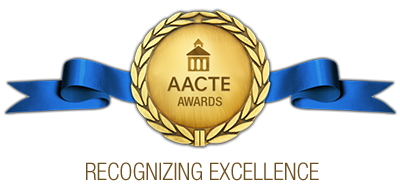
AACTE is now accepting nominations for the 2017 Outstanding Book Award. Nominations must be made through our online submission system by June 14.
The Outstanding Book Award recognizes books that make a significant contribution to the knowledge base of educator preparation or of teaching and learning with implications for educator preparation. Last year’s winner was Etta Hollins’ Rethinking Field Experiences in Preservice Teacher Preparation: Meeting New Challenges for Accountability (Routledge), and the 2015 winner was Nel Noddings’ Education and Democracy in the 21st Century (Teachers College Press); check our online honor roll for other great recommendations for your summer reading list!
06 May2016
By Sharon Robinson
I had the honor of attending a half-day conference at the White House last month celebrating the Operation Educate the Educators program, a joint initiative of AACTE and the Military Child Education Coalition (MCEC) to better prepare school personnel to meet the needs of military-connected children.
The April 13 event marked not only the Month of the Military Child but also the 5-year anniversary of Joining Forces, a critical initiative launched by First Lady Michelle Obama and Second Lady Dr. Jill Biden to support military families’ health, education, and employment. Operation Educate the Educators is a key player in the education component, comprising an impressive array of programming at more than 100 AACTE member institutions and others across the country. Biden also spoke on a related panel earlier in the week at the American Educational Research Association conference.
26 Apr2016
By Amanda Lester
The AACTE Clinical Practice Commission (CPC) was launched in June 2015 with the goals of establishing a shared lexicon, identifying model protocols and best practices, and developing actionable recommendations for the field to define and align high-quality clinical practice in teacher preparation. The commission’s work is projected to extend through December 2016, but the 68th AACTE Annual Meeting held in February provided an opportunity to share the group’s work to date and gather feedback from the field.
During the conference, members of the CPC presented their vision for clinical practice, built upon a foundation of strong PK-24 partnerships and centered on transforming educator preparation by unifying the profession. Several commissioners provided insight into the CPC’s work as presenters during the preconference event “Preparing Tomorrow’s Leaders Through School-University Partnerships,” sponsored by the Wallace Foundation, and as featured panelists in the major forum “Clinical Practice in Educator Preparation.”
Three members of the CPC, Kristien Zenkov and Audra Parker from George Mason University (VA) and Rene Roselle from the University of Connecticut, spoke at the preconference event. Their presentation summarized the commission’s progress toward developing a white paper and a shared lexicon to connect the essential elements of clinical partnerships. They also discussed the common structures of clinical preparation and the implications that clinical teacher preparation has for advancing clinical practice in principal preparation.
18 Apr2016
By Zachary VanHouten
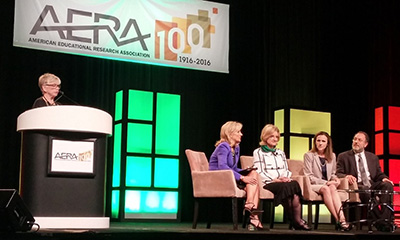
From left to right: Jeannie Oakes, University of California – Los Angeles; Second Lady Dr. Jill Biden; Mary Keller, Military Child Education Coalition; Catherine Bradshaw, University of Virginia; Ron Avi Astor, University of Southern California
During the American Education Research Association (AERA) 2016 annual meeting last week, Second Lady Dr. Jill Biden was a featured panelist in a session on military-connected students in PK-12 schools. Stressing the need for more research and additional support for these students, Biden reflected on her visits with military families around the world and the commonly overlooked needs of military-connected students.
Other panelists discussed their research on military-connected students as well as the need to ensure teachers are prepared to address the needs of these students. Mary Keller, president and CEO of the Military Child Education Coalition, joined Biden in discussing some of the transformative work that colleges of education have embarked on through the Operation Educate the Educators partnership with AACTE to ensure teachers are prepared to meet the needs of military-connected students.
12 Apr2016
By Whitney Watkins

Congratulations to April Holmes Scholar of the Month Shaywanna Harris!
Harris is a second-year doctoral student in the Counselor Education program at the University of Central Florida. Her research interests are traumatic childhood experiences, brain development in children, resilience in families, and neurofeedback training in counseling.
Harris is known for working collegially and collaboratively with diverse individuals across different organizations. As supervisor of a community counseling and research clinic at her university, she has demonstrated a commitment to successfully advocating for and valuing diversity. She also works with minority children of alcoholics by conducting research and disseminating information to the public through manuscript publications.
05 Apr2016
By Amanda Lester
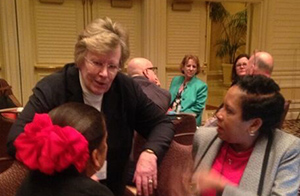
Facilitator Angela Sewall talks with participants in the Wallace-sponsored preconference event
Prior to the start of the 68th Annual Meeting, AACTE hosted a daylong workshop titled “Preparing Tomorrow’s Leaders Through School-University Partnerships Educational Leaders Preconference,” sponsored by The Wallace Foundation. The event was attended by more than 125 PK-12 and higher education leaders from across the nation, including school-university partners who attended together with the goal of strengthening their collaboration in principal preparation programs.
The event agenda featured a series of presentations and interactive PK-24 “table talk” discussions, focused on examining aspects of clinical practice and effective partnerships to advance principal preparation. Participants explored topics such as these:
05 Apr2016
By Sharon Robinson
It’s axiomatic that experts in a field are better equipped than outsiders to design interventions that will work. Yet in education, we face a constant barrage of external reform efforts that fail to incorporate professional knowledge and expertise—and they just don’t work.
This point is reinforced in recent research out of the National Education Policy Center. In this study, Marilyn Cochran-Smith and her colleagues at Boston College (MA) examine the evidentiary base underlying four national initiatives for teacher preparation program accountability and improvement. They find that only one of the initiatives—the beginning-teacher performance assessment edTPA, designed and managed by the profession—is founded on claims supported by research. With a measure that is valid, scoring that is reliable, and therefore results that are accurate, we have a serious tool for program improvement.
29 Mar2016
By David Fuentes, Kabba Colley and Sharon Leathers
In fall 2014, AACTE formed a networked improvement community (NIC) aimed at increasing the number of Black and Latino male teacher candidates in teacher preparation programs. Our College of Education at William Paterson University was among the 10 member colleges selected to participate. As we’ve worked in this collaborative group toward the goal of boosting enrollment of men of color by 25% across our programs, we’ve enjoyed a local impact that reaches well beyond the anticipated range.
The NIC employs the Carnegie Foundation for the Advancement of Teaching’s “improvement science” methodology to help participants examine our current practices and create new ones that will support the recruitment and retention of more diverse teacher candidates in our programs, and ultimately, their entrance into the teaching workforce.
29 Mar2016
By Rodrick Lucero
AACTE is excited to collaborate with the Association of Teacher Educators and the Gay, Lesbian, and Straight Education Network in a national outreach effort to determine how we can best support teacher preparation programs in training future educators to work with LGBTQ (lesbian, gay, bisexual, transgender, and queer) students. Working together, we have created a survey that we now invite you to complete.
We recognize that there is little information about how to best support teacher educators in this arena and many educators, for numerous reasons, may not be addressing these issues. Although there are pockets of excellence leading this work, few teacher preparation programs require LGBTQ issues to be included in their overall diversity initiatives. Through this survey, we hope to learn more about how LGBTQ issues are (or are not) being addressed across the country, raise models of excellence, and provide guidance for programs that are asking for support. As a token of appreciation, survey takers will be entered into a lottery to win Amazon.com gift certificates or free AACTE Annual Meeting registration!
28 Mar2016
By Jerrica Thurman
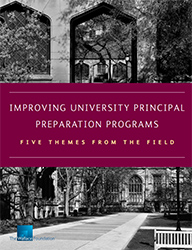 The Wallace Foundation this month announced a major new initiative to support the redesign of higher education-based programs for preparing school leaders. Investing $47 million over 5 years, the University Preparation Program Initiative will bring together selected institutions and school districts to share best practices and develop more effective principal training.
The Wallace Foundation this month announced a major new initiative to support the redesign of higher education-based programs for preparing school leaders. Investing $47 million over 5 years, the University Preparation Program Initiative will bring together selected institutions and school districts to share best practices and develop more effective principal training.
The initiative will fund improvements to principal preparation programs at up to six universities in partnership with high-need districts. It will also invest in research on effective partnerships, course work, and clinical experiences, and it will engage states in reviews of pertinent policies in support of the work. The selected universities and their district partners will be announced in the fall.
28 Mar2016
By Sungti Hsu and Yupin Bae
Editor’s note: As AACTE moves from collecting information through the Professional Education Data System (PEDS) to tapping other nationally available data sources on educator preparation, we will be providing periodic data reports on Ed Prep Matters based on PEDS, federal collections such as Title II and SASS, and other sources.
The U.S. Department of Education collects data annually from states on teacher certification/licensure programs of all kinds, as mandated by Sections 205 through 208 of the Title II of the Higher Education Act. Assembling information on programs that are “traditional” and “alternative,” based both inside and outside of institutions of higher education (IHEs), the Title II data collection aims to provide a comprehensive view of the field of teacher preparation.
22 Mar2016
By Kristin McCabe
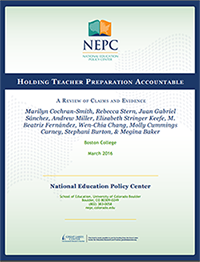 A new policy brief out of the National Education Policy Center (NEPC) reviews the evidentiary base underlying four national initiatives for teacher preparation program accountability and finds that only one of them—the beginning-teacher performance assessment edTPA—is founded on claims supported by research. The other three mechanisms included in the study are the state and institutional reporting requirements under the Higher Education Act (HEA), the Council for the Accreditation of Educator Preparation (CAEP) standards and system, and the National Council on Teacher Quality (NCTQ) Teacher Prep Review.
A new policy brief out of the National Education Policy Center (NEPC) reviews the evidentiary base underlying four national initiatives for teacher preparation program accountability and finds that only one of them—the beginning-teacher performance assessment edTPA—is founded on claims supported by research. The other three mechanisms included in the study are the state and institutional reporting requirements under the Higher Education Act (HEA), the Council for the Accreditation of Educator Preparation (CAEP) standards and system, and the National Council on Teacher Quality (NCTQ) Teacher Prep Review.
Holding Teacher Preparation Accountable: A Review of Claims and Evidence, conducted by Marilyn Cochran-Smith and colleagues at Boston College (MA), investigated two primary questions: What claims does each initiative make about how it contributes to the preparation of high-quality teachers? And is there evidence that supports these claims? In addition, researchers looked at the initiatives’ potential to meet their shared goal of reducing educational inequity.
16 Mar2016
By Mary T. Brownell and Paul T. Sindelar
The views expressed in this brief are those of the authors and do not necessarily reflect the views of AACTE.
Pending shortages of special education teachers have many states and local districts scrambling to find solutions for securing the teachers they need. Some states are proposing incentives for recruiting special education teachers (as well as teachers in other high-need areas) and reducing requirements for entry into the classroom. Others are looking for alternative ways of preparing teachers in high-need areas. Quick routes to the classroom and incentives such as signing bonuses will do little to solve the shortage problem in the long term. At best, they create a revolving door, because unprepared special education teachers are more likely to leave teaching. At worst, they exacerbate the problem. Instead, a more systemic approach to solving the teacher shortage problem in special education is needed—one that will increase the likelihood that an adequate supply of fully prepared special education teachers enters the classroom and remains there.












